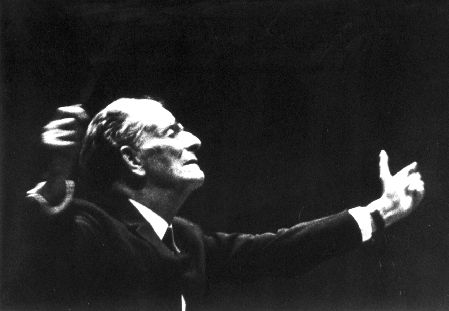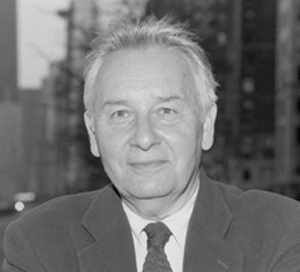

| Home | Martin | Górecki | Murrill | Contact |
 |
 |

Frank Martin, son of a Swiss Calvinist minister, wrote his Mass for Double Chorus in the 1920s, but did not permit its performance until 1963 because he believed it “unworthy”. Austere yet deeply inspiring, the Mass is today recognized as one of the great choral monuments of the 20th century. New Yorker music critic Alex Ross describes the Mass as follows: “It was written back in 1922, well before Stravinsky's Symphony of Psalms made it fashionable for French-speaking composers to strike a monkish pose. It sounds like a Renaissance mass lost in time, aware nonetheless of long centuries passing and new horrors unfolding.”
Polish composer Henryk Górecki is probably best known for the 1992 worldwide sensation created by the best-selling recording of his Third Symphony with Dawn Upshaw and the London Sinfonietta under David Zinman. Górecki composed Miserere in 1981, dedicating it to the then-clandestine trade union Solidarity, but Polish authorities did not permit its performance until 1987. It stands today as an urgent, sonorous plea for peace.
Herbert Murrill, who was Head of Music at the BBC at his death in 1952 at age 43, wrote a beautiful setting of the Magnificat and Nunc Dimittis which will also be featured on November 3.

|
From Alex Ross's blog, “The Rest is Noise”:
“Martin was born in Geneva in 1890, and lived until 1974. The details of his life are unremarkable. In photographs, he resembles the cordial pastor of a sleepy Swiss hamlet. He was, however, one of the greatest religious composers of the last two hundred years, with Messiaen his only contemporary rival. Messiaen, a perfect Catholic, celebrated God with exuberance and panache; Martin, the good son of a Calvinist minister, argued for faith as a constant struggle. For many years, he refused to release his Mass for Double Choir, written in 1922, on the ground that it was unworthy of the Lord. In the past few decades, the Mass has gone around the world, entrancing audiences with the archaic majesty of its language. Martin had a gift for immersing himself in styles of the past without seeming to imitate them; in his youthful Piano Quintet, for example, he does not allude to Bach so much as meld with him. (An ASV recording of this work, with members of the Britten-Pears Ensemble, is one of the gems of the Martin renaissance.)”

|
From the web site of the Polish Music Information Center (Polish Composers' Union):
“Henryk Mikolaj Gorecki began his career as an extremely avantgarde composer. His work SCONTRI, performed for the first time at the WARSAW AUTUMN INTERNATIONAL FESTIVAL OF CONTEMPORARY MUSIC in 1960 challenged audiences and became a symbol of the Polish musical avant garde with its shocking modernity. In 1976, Gorecki produced yet another challenge in the shape of his THIRD SYMPHONY, SYMPHONY OF LAMENTATION SONGS, also performed at the WARSAW AUTUMN INTERNATIONAL FESTIVAL OF CONTEMPORARY MUSIC. This work was radically different, in which he simplified his language and reduced his means of expression. Some hailed him as a genius, others accused him of being a dilettante. The composer would have remained one of the many avantgarde composers "converted" to traditional music, if it had not been for the unusual events of sixteen years later. In 1992, the THIRD SYMPHONY was first on the American and English bestseller lists, and the entire world was talking about Gorecki. This was thanks to the American label Elektra Nonesuch and its recording of the SYMPHONY by the American singer Dawn Upshaw and the London Sinfonietta, conducted by David Zinman. The English radio "Classic FM" played excerpts from day and night, on request from its listeners. Both classical music lovers and people who had nothing at all in common with classical music listened to it, like young people and long-haul truck drivers. Gorecki, with his simple yet fiery music, reached the hearts of them all, revealing the world of the most basic emotions of all.”
Notes on Miserere from Resonance FM, “London's first radio art station”:
“Miserere is a stunning work, a response to the political upheaval in Poland that surrounded the United Peasant Party in 1981 when members of the Rural Solidarity were slaughtered by the militia. In response to this Górecki immediately composed this work for large unaccompanied chorus which for the first thirty minutes intones the words “Domine Deus Noster” (Lord our God), first by massive male voices intoning, plea-like, then joined by women's voices in agitation and ultimate reverence, adding only at the very end the words “Miserere nobis” (have mercy on us). If any listener fails to be moved by this quiet, urgent, sonorous plea for peace, then we as a universal people have much work to do!”
Herbert Murrill (1909–1952), a London native, was active as a composer and musical administrator; he taught composition at the Royal Academy of Music and was Head of Music at the BBC for the last two years of his life. In 1930, while a student at the Royal Academy of Music, his opera Man in Cage was premiered in London. He worked as a teacher, organist and choirmaster until 1935, when he became musical director for the Group Theatre in London. He joined the BBC in 1936; after taking time off in 1942–1946 for war service in the Intelligence Corps, he became Head of Music in 1950. He died at the young age of 43.
Murrill is known mainly for small-scale organ and choral works, but he also wrote a string quartet, two cello concertos (his wife was a cellist), and two film scores.
Site maintained by Peter Pulsifer, concert promotions director for Chorus pro Musica in Boston, MA, USA.
Last update October 10, 2006.